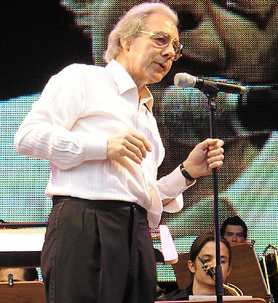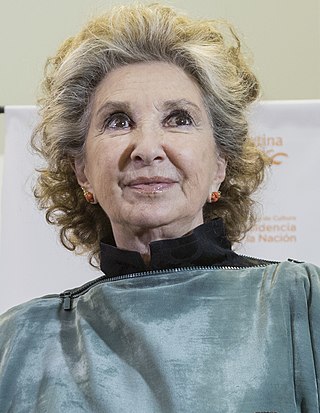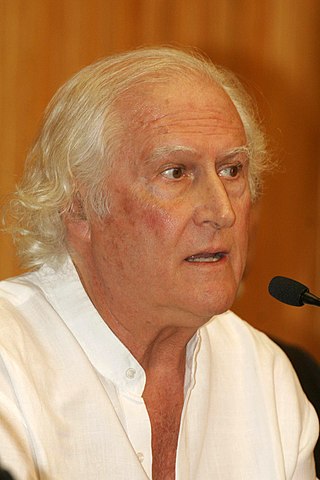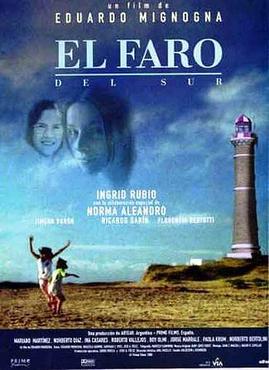A list of films produced in Argentina in 1998:
Mercedes may refer to:

Gaspar Noé is an Argentine filmmaker, who lives and worked primarily in France. He is one of the primary exponents of New French Extremity, with his most notable works including the feature films I Stand Alone (1998), Irréversible (2002), Enter the Void (2009), Love (2015), Climax (2018), Lux Æterna (2019), and Vortex (2021). Noé's father is artist and writer Luis Felipe Noé.

Boris Claudio "Lalo" Schifrin is an Argentine-American pianist, composer, arranger, and conductor. He is best known for his large body of film and TV scores since the 1950s, incorporating jazz and Latin American musical elements alongside traditional orchestrations. He is a five-time Grammy Award winner; he has been nominated for six Academy Awards and four Emmy Awards.

Natalia Marisa Oreiro Iglesias is a Uruguayan actress, singer, songwriter, model, television presenter and fashion designer. She began her career in telenovelas but since 2008 she has switched to work primarily in films. Oreiro has worked on social awareness shows and events for organizations like Greenpeace and UNICEF, the latter of which designated her as ambassador for Argentina and Uruguay in September 2011.

Norma Aleandro is an Argentine actress. She is considered one of the most celebrated and prolific Argentine actresses of all time and is recognized as a cultural icon in her home country.

Libertad Lamarque Bouza was an Argentine and Mexican actress and singer, became one of the most iconic stars of the Golden Age of cinema in both Argentina and Mexico. She achieved fame throughout Latin America, and became known as "La Novia de América". By the time she died in 2000, she had appeared in 65 films and six telenovelas, had recorded over 800 songs and had made innumerable theatrical appearances.

Fernando Ezequiel "Pino" Solanas was an Argentine film director, screenwriter, score composer and politician. His films include; La hora de los hornos (1968), Tangos: el exilio de Gardel (1985), Sur (1988), El viaje (1992), La nube (1998) and Memoria del saqueo (2004), among many others. He was National Senator representing the Autonomous City of Buenos Aires for six years, from 2013 to 2019.

Cinema of Argentina refers to the film industry based in Argentina. The Argentine cinema comprises the art of film and creative movies made within the nation of Argentina or by Argentine filmmakers abroad.

Tango is a 1998 Argentine-Spanish musical drama film written and directed by Carlos Saura and starring Miguel Ángel Solá and Mía Maestro. It was photographed by cinematographer Vittorio Storaro.
Patagonik Film Group is an Argentine production company, dedicated to the making of feature films and film production services. A part of the Clarín Group, Patagonik Film Group also assists in the production of international films that want to film in Argentina.
This is an index to pages listing Argentine films ordered by year of release. For an A-Z list, see Category:Argentine films.

The cinema of Paraguay has historically been small. However, this has begun to change in recent years with films like El Toque del Oboe (1998); María Escobar (2002); O Amigo Dunor (2005), which competed for Best Movie in the Rotterdam International Film Festival; Hamaca Paraguaya (2006), which was screened at the Cannes Film Festival, gaining critical acclaim both in Paraguay and abroad; 7 cajas (2012); Latas Vacías (2014); and Luna de Cigarras (2014).

Héctor Olivera is an Argentine film director, producer and screenwriter. Olivera worked mainly in the cinema of Argentina, but also has directed or contributed to several films made for the United States market.

Israel Adrián Caetano, known as Adrián Caetano, is an Uruguayan film director, producer and screenwriter.

El faro is a 1998 Argentine-Spanish drama film directed by Eduardo Mignogna. The film is also known in Spain as El faro del Sur.

Pizza, Beer, and Cigarettes is a 1998 Argentine crime drama film written and directed by Israel Adrián Caetano and Bruno Stagnaro and starring Héctor Anglada, Jorge Sesan and Pamela Jordán. The film tells the story of a gang of marginalized adolescents who survive on the streets of Buenos Aires carrying out low-level robberies. Pizza, Beer, and Cigarettes is the film that's known as "the spark that ignited the New Argentine Cinema when it premiered at the international Mar del Plata Film Festival." It was filmed entirely in Buenos Aires.
Bruno Stagnaro is an Argentine film and television director, producer and screenwriter. He works mainly in the cinema of Argentina. He has also acted professionally a few times. He is the son of renowned filmmaker Juan Bautista Stagnaro.

Argentina, officially the Argentine Republic, is a country in the southern half of South America. Argentina covers an area of 2,780,400 km2 (1,073,500 sq mi), making it the second-largest country in South America after Brazil, the fourth-largest country in the Americas, and the eighth-largest country in the world. It shares the bulk of the Southern Cone with Chile to the west, and is also bordered by Bolivia and Paraguay to the north, Brazil to the northeast, Uruguay and the South Atlantic Ocean to the east, and the Drake Passage to the south. Argentina is a federal state subdivided into twenty-three provinces, and one autonomous city, which is the federal capital and largest city of the nation, Buenos Aires. The provinces and the capital have their own constitutions, but exist under a federal system. Argentina claims sovereignty over the Falkland Islands, South Georgia and the South Sandwich Islands, the Southern Patagonian Ice Field, and a part of Antarctica.
Eugenio Zanetti is an Argentine dramatist, painter, film set designer, and theater and opera director. He won an Academy Award for Best Art Direction in 1995, for the film Restoration.
Events from the year 1930 in Argentina